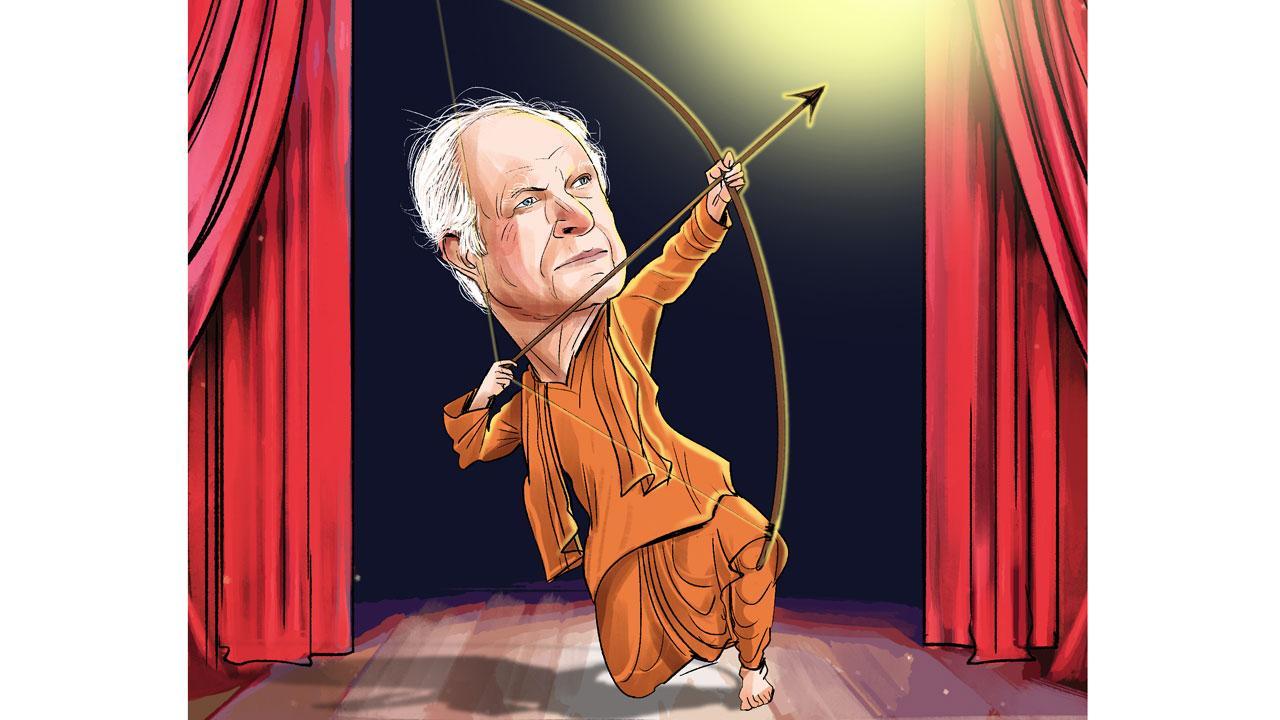A stage space has two rules: Anything can happen and Something must happen.

Illustration/Uday Mohite
 “I can take any empty space and call it a bare stage. A man walks across this empty space whilst someone else is watching him, and this is all that is needed for an act of theatre to be engaged”
“I can take any empty space and call it a bare stage. A man walks across this empty space whilst someone else is watching him, and this is all that is needed for an act of theatre to be engaged”
ADVERTISEMENT
Peter Brook
Peter Brook was a hero of mine. A deep, deep, revered hero. My admiration was steeped in his ability to look at words on a page… and then rack them up on a stage, in the most impossibly creative way.
When you embark on a career, in my case the theatre, in the 1980s, I was obviously, searching for an approach—at this time, two Peters were my heroes: Peter Hall and Peter Brook. The two Peters approached their theatre in markedly different ways—Hall looked at the bound script, Brook looked at the bare stage.
Initially, I was always more drawn to Hall, because he explored words and dialogue… found ways to interpret Harold Pinter and Peter Schaffer—till I saw Brook’s The Mahabaratha—he did what had always terrified me, used his source material as an empty stage.
A slight variation from the Sting song, in the winter of 1987, I was an Indian in New York—freezing in sub- zero temperatures, in a pre -Wikipedia, WhatsApp world, I longed for something home, anything familar—that’s when the Brooklyn Academy of Music (BAM), publicised their production of Peter Brook’s The Mahabaratha.
Like all Indians, I felt a combination of cynicism and curiosity.
There was an option, see the play straight through as a nine-hour experience or watch the three acts over three evenings. My uncle and aunt, Gerson and Uma daCunha had bought us tickets for the Mahabara-thon!
The thought of someone having adapted the one hundred and twenty five thousand verse epic, sounded intriguing.
The thought of a nine-hour straight through, sounded exhausting.
An unwelcome wisdom tooth appeared on the morning of the performance.
This, to be honest, was pain mixed with relief.
The less strenuous three hours per evening became a reality, the three parts titled, The Game of Dice, The Exile in the Forest and The War.
Peter Brook had piqued my interest, in an interview, when he said two things-
1. A stage space has two rules: Anything can happen and Something must happen.
2. The first audience for any of my productions is myself, if I am bored, so will the audience be.
As I sat down, that first evening in Brooklyn, and soaked in the “five minutes to show time” tingle, I looked at the bare stage, Peter Brook’s palette, his perspective, the empty physical space, nothing prepared me for what was about to unfold in front of my eyes
I sensed the beginning of a spiritual experience. This was the great Indian story, on a New York stage, directed by an Englishman, adapted and written by a Frenchman, 21 actors from 16 countries, a Caribbean Karna advising an Italian Arjuna, and the battle scenes vs a Polish Duryodhana.
And yet there was no gimmickry, only sheer gravitas, on this stage, that heightened minimalism could yield such a spectacle.
Peter Brook, even while he carried the label of a showman, remained the explorer of spaces (when this production opened in Avignon , France, he chose a dawn-to-dusk staging in an open air quarry).
And yet this humble, patient man, said of himself, that he was “simply a director penetrating into human questions through human material”.
The actor, Adrian Lester once said of him as they rehearsed Hamlet, “Peter directed your thoughts, he was interested in what you meant, you were always left digging into deeper parts of yourself, in doing a play with him, you didn’t know where his work finished and your work started, it just felt like you were completely free on stage.”
Peter Brook directed well into his 90s.
Rest in peace, sir, thank you for never letting the old man in.
Rahul daCunha is an adman, theatre director/playwright, photographer and traveller. Reach him at rahul.dacunha@mid-day.com
 Subscribe today by clicking the link and stay updated with the latest news!" Click here!
Subscribe today by clicking the link and stay updated with the latest news!" Click here!







